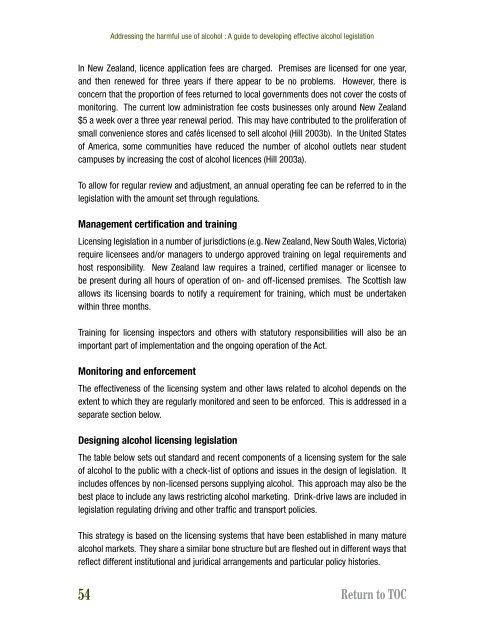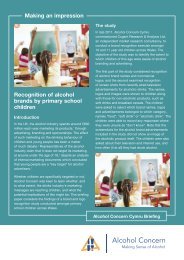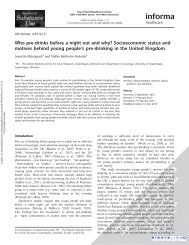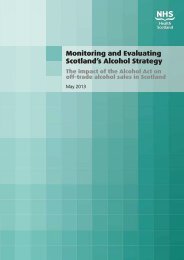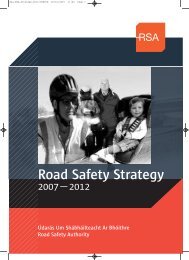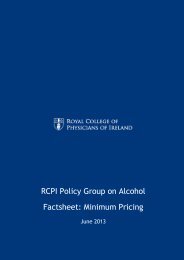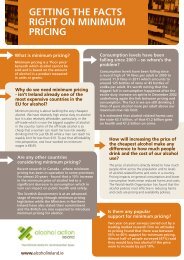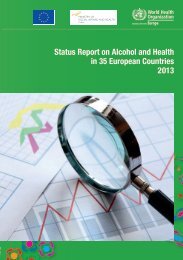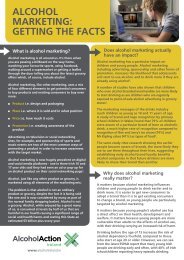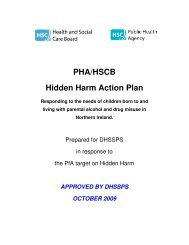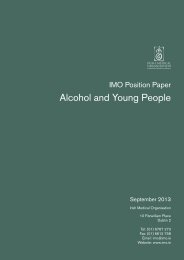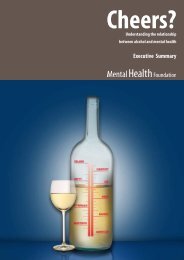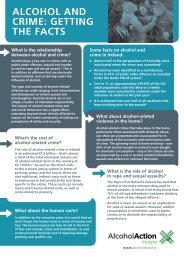Addressing the harmful use of alcohol - WHO Western Pacific Region
Addressing the harmful use of alcohol - WHO Western Pacific Region
Addressing the harmful use of alcohol - WHO Western Pacific Region
Create successful ePaper yourself
Turn your PDF publications into a flip-book with our unique Google optimized e-Paper software.
<strong>Addressing</strong> <strong>the</strong> <strong>harmful</strong> <strong>use</strong> <strong>of</strong> <strong>alcohol</strong> : A guide to developing effective <strong>alcohol</strong> legislation<br />
In New Zealand, licence application fees are charged. Premises are licensed for one year,<br />
and <strong>the</strong>n renewed for three years if <strong>the</strong>re appear to be no problems. However, <strong>the</strong>re is<br />
concern that <strong>the</strong> proportion <strong>of</strong> fees returned to local governments does not cover <strong>the</strong> costs <strong>of</strong><br />
monitoring. The current low administration fee costs businesses only around New Zealand<br />
$5 a week over a three year renewal period. This may have contributed to <strong>the</strong> proliferation <strong>of</strong><br />
small convenience stores and cafés licensed to sell <strong>alcohol</strong> (Hill 2003b). In <strong>the</strong> United States<br />
<strong>of</strong> America, some communities have reduced <strong>the</strong> number <strong>of</strong> <strong>alcohol</strong> outlets near student<br />
camp<strong>use</strong>s by increasing <strong>the</strong> cost <strong>of</strong> <strong>alcohol</strong> licences (Hill 2003a).<br />
To allow for regular review and adjustment, an annual operating fee can be referred to in <strong>the</strong><br />
legislation with <strong>the</strong> amount set through regulations.<br />
Management certification and training<br />
Licensing legislation in a number <strong>of</strong> jurisdictions (e.g. New Zealand, New South Wales, Victoria)<br />
require licensees and/or managers to undergo approved training on legal requirements and<br />
host responsibility. New Zealand law requires a trained, certified manager or licensee to<br />
be present during all hours <strong>of</strong> operation <strong>of</strong> on- and <strong>of</strong>f-licensed premises. The Scottish law<br />
allows its licensing boards to notify a requirement for training, which must be undertaken<br />
within three months.<br />
Training for licensing inspectors and o<strong>the</strong>rs with statutory responsibilities will also be an<br />
important part <strong>of</strong> implementation and <strong>the</strong> ongoing operation <strong>of</strong> <strong>the</strong> Act.<br />
Monitoring and enforcement<br />
The effectiveness <strong>of</strong> <strong>the</strong> licensing system and o<strong>the</strong>r laws related to <strong>alcohol</strong> depends on <strong>the</strong><br />
extent to which <strong>the</strong>y are regularly monitored and seen to be enforced. This is addressed in a<br />
separate section below.<br />
Designing <strong>alcohol</strong> licensing legislation<br />
The table below sets out standard and recent components <strong>of</strong> a licensing system for <strong>the</strong> sale<br />
<strong>of</strong> <strong>alcohol</strong> to <strong>the</strong> public with a check-list <strong>of</strong> options and issues in <strong>the</strong> design <strong>of</strong> legislation. It<br />
includes <strong>of</strong>fences by non-licensed persons supplying <strong>alcohol</strong>. This approach may also be <strong>the</strong><br />
best place to include any laws restricting <strong>alcohol</strong> marketing. Drink-drive laws are included in<br />
legislation regulating driving and o<strong>the</strong>r traffic and transport policies.<br />
This strategy is based on <strong>the</strong> licensing systems that have been established in many mature<br />
<strong>alcohol</strong> markets. They share a similar bone structure but are fleshed out in different ways that<br />
reflect different institutional and juridical arrangements and particular policy histories.<br />
54 Return to TOC


